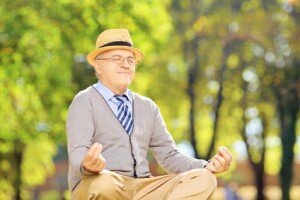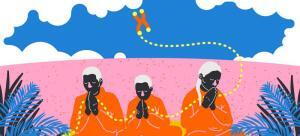Is it me or do long term Mindfulness practitioners age more slowly than the general population?
 One thing we all have in common is that we are all getting old, and a set of interesting research is emerging to suggest that lifestyle changes, such as those that come about through Mindfulness practice, can help us to maintain mental capacity and wellbeing as we age. I had to look into this myself last week as I gave a Mindfulness taster session to an Italian Association of care providers for the elderly. This Italian Association are now wanting to work with our trainers in Italy to introduce Mindfulness throughout their organisation, which is wonderful news.
One thing we all have in common is that we are all getting old, and a set of interesting research is emerging to suggest that lifestyle changes, such as those that come about through Mindfulness practice, can help us to maintain mental capacity and wellbeing as we age. I had to look into this myself last week as I gave a Mindfulness taster session to an Italian Association of care providers for the elderly. This Italian Association are now wanting to work with our trainers in Italy to introduce Mindfulness throughout their organisation, which is wonderful news.- Connect – the cultivation of kindness and compassion in our Mindfulness training can help us to connect more profoundly with our family, friends and work colleagues. Loneliness is a big cause of suffering for the elderly and connecting with others can help reduce this. Moreover, Mindfulness courses have been found to reduce the perception of loneliness in groups of elderly participants.
- Be Active – our Mindfulness courses include Mindful movement and many of us take up more physical activity as a result of our Mindfulness practice, particularly yoga, qi quong or Mindful walking in nature. Our Mindfulness practice increases our bodily awareness and, in my experience, leads to a greater felt sense of the physical wellbeing that comes from being physically active. Also, our Mindfulness practice can reveal some of our hidden attitudes to exercise and so free us from habitual patterns that previously might have stopped us from being physically active.
- Take Notice – as Mindfulness practitioners we have a big advantage over the general population, as we have been actively training in being present and curious about our experience and attuning to and savouring positive experiences in daily life.
- Keep Learning – again with our Mindfulness practice we have the advantage of regularly learning more about ourselves and our habitual patterns of thought and behaviour, which gives us the opportunity of doing something different from the habitual way. We can also think about learning new skills. For example, I am determined to learn to speak Italian, as I work in Italy on a regular basis. What would you like to learn in the New Year?
- Give – cultivating kindness and compassion through our Mindfulness practice can give rise to growing gratitude and appreciation for those around us and an increased impulse to give to those around us and to contribute more fully to our world. Giving is a theme we will cover at the Compassion in Action weekend.
To finish, let me mention that research shows how certain parts of the brain, that thin in a general ageing population, do not thin in long term meditators, which is encouraging. Also, chromosome damage that leads to ageing may be slowed in meditators, due to less damage to the telomeres (goggle it!).
So no need to invest in expensive face creams to look younger, instead invest in a daily Mindfulness practice and practice these five ways to wellbeing. There are plenty of opportunities to connect, be active, take notice, keep learning and give, if we are open to them.
–Heather Regan-Addis


